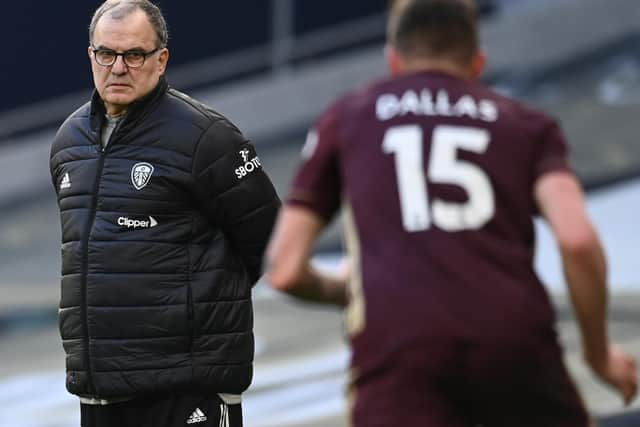Marcelo Bielsa tells Newell's Old Boys story to explain why Leeds United player improvement isn't down to him
and live on Freeview channel 276
Marcelo Bielsa doesn't accept praise for developing players at Leeds United because he doesn't feel responsible.
The Whites head coach used a story about his time at Newell's Old Boys to explain his reasoning ahead of tonight's clash with Everton in the Premier League.
Advertisement
Hide AdAdvertisement
Hide AdBielsa arrived at Elland Road in the summer of 2018 and has swiftly taken the club from depths of the Championship to mid-table in England's top division.


Leeds earned promotion to the top flight under the Argentine's stewardship at the second time of asking in July, ending 16 years of hurt in the Football League for the club.
Bielsa has been heavily reliant on players and academy products already plying their trade in LS11 since his arrival in West Yorkshire nearly three years ago, adding a sprinkle of international talent in last summer's transfer market.
Two of those signatures in Robin Koch and Diego Llorente have been sidelined through injury for the majority of the campaign while Rodrigo and Raphinha have enjoyed plenty of game time.
Advertisement
Hide AdAdvertisement
Hide AdUnited, though, finished the impressive 3-1 victory over Leicester City on Sunday with eleven players who all featured in the Championship previously under the 65-year-old.
Patrick Bamford is just one of those to step up following the club's promotion last term, having scored 11 goals this season while the form of Kalvin Phillips, Stuart Dallas, Luke Ayling and Jack Harrison among many others has been praised.
Bielsa dismissed suggestions that as head coach he was entirely responsible, believing a player has to be motivated to work alongside a manager to unlock their full potential.
In a lengthy explanation to the media, the Leeds boss reflected on his own experiences as to why it was the case and used a story from his time on the coaching staff with his beloved boyhood outfit.
Advertisement
Hide AdAdvertisement
Hide Ad"Players improve, they drop down, and they improve again," Bielsa said.
"You’re attributing a capacity which I don’t think I have. I’m joined with the player in trying to get the best out of him so that he can show his capabilities.
"Many virtues that players don’t use are because it’s more comfortable not to use them. To leave the state of comfort and to get out of the comfort and go above and beyond is not linked to a manager, but it's linked to the ambition of a player.
"I’m going to give you an example from 40 years ago. I spent 10 years in the formation phase of football accompanying Jorge Griffa, who was an expert in this.
Advertisement
Hide AdAdvertisement
Hide Ad"In the club where I come from, Newell’s Old Boys, the formation and foundation of players was the most important thing. There were always young players with incredible ambitions. There was always young players who never managed to show their capabilities due to a lack of ambition.
"There, we worked five or six coaches and every time that a coach had that player that didn’t shine, every time another of the coaches would say, ‘don’t worry, next year I will take the best out of him’.
"The player would go through the five coaches that accompanied Griffa, the player wouldn’t triumph and the conclusion, what was it? The conclusion was it’s not how good the coach was, it’s the ambition of the player and how much he wants it.
"Coaches don’t make great players. The ambition, the character, the determination of a player is what allows them to be great players.
Advertisement
Hide AdAdvertisement
Hide Ad"I was thinking about this subject the other day, because we all had an idea who we looked up to when we were young. We can say I wanted to be a footballer because of this player or I stayed in football because of this player.
"So what makes a player into a player? Their imitation that they establish with a player that they admire, but a player is not a professional player. It’s very similar, but the professional competes.
"There’s a lot of development in the technical and physical qualities that is very good. But there’s few other resources to establish a better mindset and to increase the ambition of a player.
"There's a difference between playing, knowing how to play, that's to say take decisions, and to compete, which is a statement of mind.
Advertisement
Hide AdAdvertisement
Hide Ad"The most competitive players get the best out of themselves. They show everything that they bring. This explanation of the story shows that the attribute, this gift of knowing the potential of a player is not just.
"I gave this long explanation which tires me out so you don't think it's false modesty."